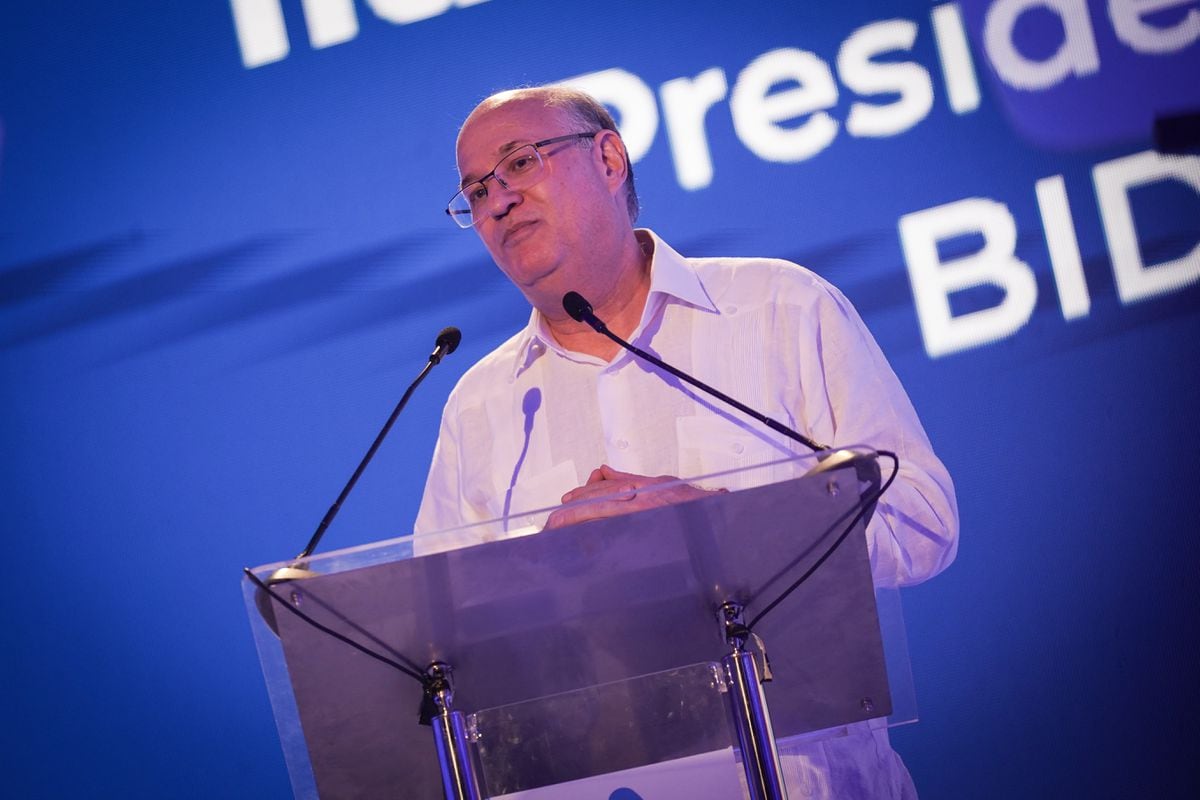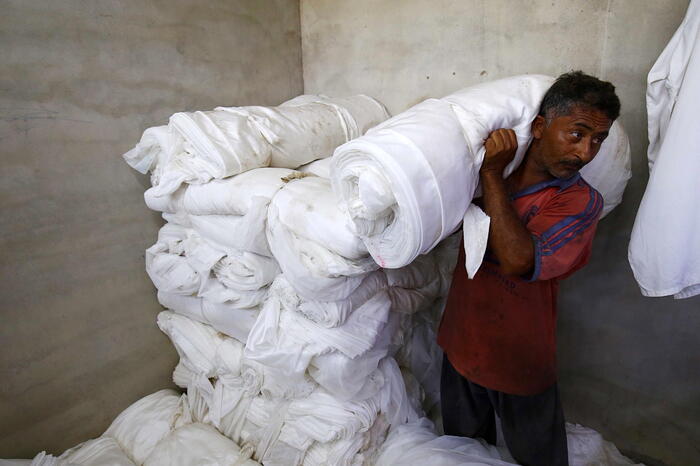Icon: enlarge
Luxury yachts in Monaco: The pandemic did not reduce the wealth of the richest people in the world, it only increased them
Photo: John Greim / Loop Images / Universal Images Group / Getty Images
The corona pandemic is not over yet, but the bill for the crisis already seems gigantic.
The international community is spending record sums to slow down the virus with vaccination campaigns, rescue programs and restrictions.
But while in the past year many people feared for their jobs, the property of the richest people in the world continued to grow.
The total assets of the more than 2000 dollar billionaires worldwide rose to a record value of around 10.2 trillion dollars (8.7 trillion euros) by the end of July 2020.
This is based on calculations by the consulting company PwC and the major Swiss bank UBS.
The increased inequality could cause social explosives in many countries in the coming months: How should things go after the crisis?
And who should pay for the costs?
The economist Max Krahé deals with the consequences of economic inequality.
Instead of debt, he advises, it is better to talk about investments.
The existing problems in many countries are not due to excessive spending, but rather an uneven distribution and wrong priorities.
To cushion the effects of the pandemic, he recommends checks and bolder politics - especially in Europe.
SPIEGEL:
At the beginning of the corona crisis, a new sense of solidarity was often invoked.
There is often little evidence of this today.
In retrospect, was it a mistake to assume that the crisis would hit us all equally?
Max Krahé:
I think it was the honest feeling of many people.
But after almost a year we notice that people in different classes and regions are actually experiencing the crisis very differently.
Studies show that poorer and migrant milieus are much less protected from the virus.
Social inequality is therefore a risk factor for its spread.
So if we are to get out of the pandemic we have to talk about it.
SPIEGEL:
Those who are poorly paid seem to be particularly relevant to the system.
Why didn't the broad public sympathy lead to nurses and parcel delivery staff receiving higher wages?
Krahé:
With all reforms there is a point where pressure is built up from below and the problem is recognized from above.
That was the case with the right to vote, the approval of trade unions or the introduction of minimum wages.
It is different here.
There is applause, but little pressure from below.
There is a lack of self-organization in the low-wage sector, also for structural reasons: Many industries have been made more flexible on purpose.
Those who work as parcel deliverers today feel that they can be replaced.
That is why this conflict is so asymmetrical.
Those who invested in the spring are often richer today
SPIEGEL:
In fact, inequality has continued to rise in the pandemic.
The richest people in the world are wealthier today than they were before the crisis.
How can this be explained?
Krahé:
Some of these are paper
values that
rise with the share price.
In fact, political decisions also play a role here: for almost three decades there has been a consensus in Europe that the economy can be stimulated through the financial markets.
If there is a crisis, money should be made cheap so that companies can get loans and invest.
But above all, that strengthens the stock markets.
Accordingly, they recover much faster.
Anyone who had enough money in March 2020 to buy stocks, bonds or funds has probably already benefited from the pandemic today.
On the other hand, those who only have to live on their wages often earn less or are unemployed.
This gap also existed before Corona.
What bothers me is that the discussion about it has been completely depoliticized.
Politicians often pretend that there is nothing they can do to change the system.
It is hoped that the money from the financial markets will automatically reach everyone.
That is convenient, politicians do not have to make direct decisions.
This system often increases the existing inequalities.
Politicians should dare to actively decide on the fundamental mechanisms of our economy.
Icon: enlarge
Catalan groups protest against the government's corona policy in front of the Barcelona Stock Exchange
Photo: Albert Llop / NurPhoto / Getty Images
SPIEGEL:
Many wealthy people showed themselves to be extremely generous during the pandemic and used their money to support foundations, research work or social causes.
Isn't that also an important contribution?
Krahé:
Basically it is definitely better than if the money is unused in the bank.
But donations do not create reliability.
But that is exactly what we need to combat a global crisis.
We cannot make the systemically important areas dependent on the top 0.2 percent doing the right thing.
Spain and Italy are hit particularly hard by the pandemic
SPIEGEL:
In Europe, the pandemic particularly hit countries that were already in crisis before Corona: Italy, Spain and Great Britain, for example.
Is it just a coincidence that they seem so helpless in the current situation?
Krahé:
I don't think so.
Right at the beginning of the pandemic, we saw how much these countries had to be careful that their government bonds did not crash.
Every issue had to be checked against this background.
These countries could not react in the same way as Germany, for example, which was able to provide the company with 400 billion euros in guarantees, 50 billion euros in emergency aid and another 100 billion euros in discounted loans within a very short time.
This is another reason why it is important to strengthen your balance.
SPIEGEL:
What do you suggest?
Krahé:
One could increase purchasing power in the short term by
handing
money into the hands of all citizens.
If you refinance that through taxes a few years later, it would hit everyone fairly to their own liking.
This would reliably increase demand.
Germany in particular could thus strengthen other countries without exports having to suffer.
Higher wages in response to the crisis
SPIEGEL:
The costs of the current crisis are already historic.
Still, they suggest spending a lot more money in the future.
How is that supposed to work?
Krahé:
It would be fatal if everyone saved themselves now.
There is now a consensus in economics that debt is less risky than was long thought.
Over-saving has recently proven to be much more dangerous.
In the era of negative interest rates, governments can and should actively issue bonds.
This would enable them to invest in digital and green infrastructure and ensure better salaries and more staff in schools, daycare centers, hospitals and care facilities.
Tomorrow's incomes, not yesterday's debts, determine the sustainability of our public finances.
I therefore advocate a kind of high pressure economy after the pandemic.
This means that demand is selectively increased through monetary policy and government spending.
Unemployment should fall as a result and companies will notice that it is worth investing.
To put it bluntly: we have to butter it up properly.
Icon: enlarge
Closed shop in the old town of Barcelona: According to EU estimates, the gross domestic product in Spain fell by around 12 percent last year
Photo: Angel Garcia / Bloomberg / Getty Images
SPIEGEL:
What about states that are not equipped with the capabilities of European welfare states?
Krahé:
There are different approaches.
In India, a form of job guarantee has long existed that promises the rural population up to 100 days of simple wage work per year.
Wages are linked to the local price level and are paid from general tax revenue.
Strengthening such a program could at least provide moderate compensation after the pandemic.
There are already short-term concepts: In Argentina, a special tax was introduced last year in order to allow the richest part of the population to share in the costs of the pandemic.
There, where state structures are particularly weak, much is gained if health services, food and housing are made available free of charge.
This is often frowned upon, but it helps people immediately and stabilizes their situation.
And that's the goal of good politics.
Icon: The mirror
This contribution is part of the Global Society project
What is the Global Society project? Up arrow Down arrow
Under the title Global Society, reporters from
Asia, Africa, Latin America and Europe
report on injustices in a globalized world, socio-political challenges and sustainable development.
The reports, analyzes, photo series, videos and podcasts appear in the international section of SPIEGEL.
The project is long-term and will be supported by the Bill & Melinda Gates Foundation (BMGF) for three years.
A detailed FAQ with questions and answers about the project can be found here.
What does the funding look like in concrete terms? Up arrow Down arrow
The Bill & Melinda Gates Foundation (BMGF) is supporting the project for three years with a total of around 2.3 million euros.
Is the journalistic content independent of the foundation? Up arrow Down arrow
Yes.
The editorial content is created without the influence of the Gates Foundation.
Do other media have similar projects? Up arrow Down arrow
Yes.
Major European media outlets such as "The Guardian" and "El País" have set up similar sections on their news pages with "Global Development" and "Planeta Futuro" with the support of the Gates Foundation.
Have there already been similar projects at SPIEGEL? Up arrow Down arrow
In recent years, SPIEGEL has already implemented two projects with the European Journalism Center (EJC) and the support of the Bill & Melinda Gates Foundation: The "Expedition The Day After Tomorrow" on global sustainability goals and the journalistic refugee project "The New Arrivals", as part of this several award-winning multimedia reports on the topics of migration and flight have emerged.
Where can I find all publications on Global Society? Up arrow Down arrow
The pieces can be found at SPIEGEL on the topic Global Society.








